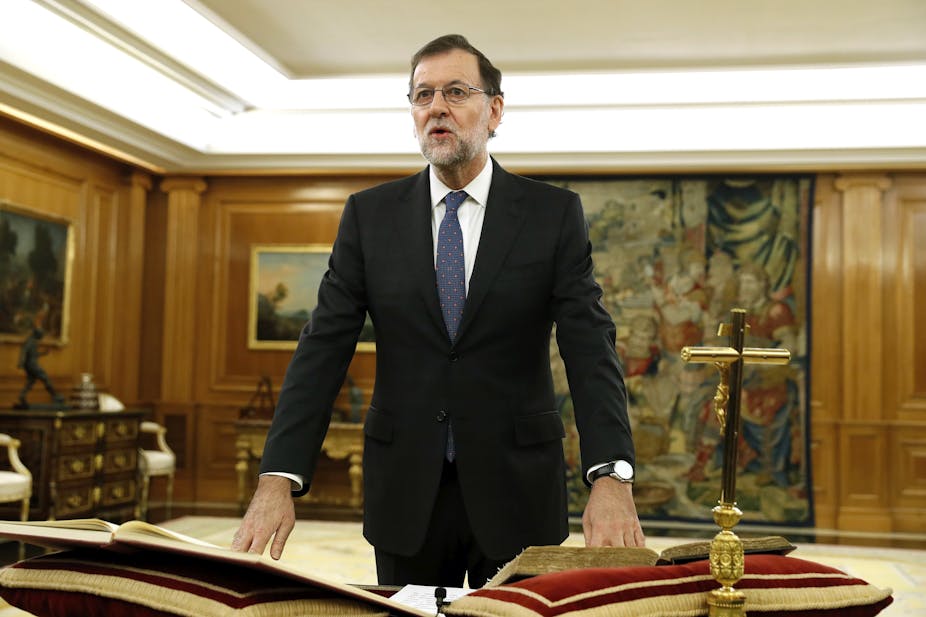When Spanish prime minister Mariano Rajoy was finally able to announce the formation of a minority government after 10 months of deadlock, he called for political unity. The national parliament must work together to make up for lost time, he said.
But that unity will not easily be achieved while most other political parties are embroiled in their own internal struggles. Rajoy was only able to make his breakthrough thanks to a decision by the Socialist Party (PSOE) to abstain from a vote to allow him to form a government, rather than voting against him. That decision has split the party and led to the resignation of its leader, Pedro Sánchez.
Spain has endured two elections in the past year alone, and Rajoy’s centre-right People’s Party (PP) was the only major party to increase its vote and number of seats between those two votes. Rajoy’s strategists will therefore already be planning their next move.
The PP may be looking to dissolve parliament to call a fresh election. That could happen as early as May 2017 – as soon as is constitutionally possible. Rajoy sees a chance to secure a more stable share of the vote and even to form a majority government. It will not have escaped his attention that the PSOE’s abstention in his investiture vote was linked to its desire to avoid going to the polls at such a moment of weakness.
Socialists in disarray
The current political environment is challenging for social democratic parties all over the world, but the PSOE appears more hapless than most.
Having resigned as party leader at the beginning of October, Sánchez stepped down from parliament altogether on the eve of Rajoy’s successful investiture vote. His departure drew a close to an alarming month of infighting for the socialists.

The caretaker leadership that took over was keen to avoid another election. Given how many votes the party had lost between the elections in December 2015 and June 2016 votes, its position is weak. Its chances of being able to form a government, even in coalition, were slim at best. It would have needed the support of left-wing upstart Podemos and independence-supporting regional parties. That was acceptable to Sánchez, but not to some of his opponents in the party, many of whom were involved in the caretaker leadership.
While the party membership generally backed Sánchez’s stance of voting against Rajoy’s minority government and forcing another election, 68 of the party’s 85 deputies abstained on the orders of the caretaker leadership.
Essentially, the split within the party centred on whether the Socialists should pragmatically acknowledge their own fragility and permit Rajoy to form a government on the basis that his party obtained the most seats in June, or whether, as Sánchez suggested, they should, on principle, vote against a party which has enthusiastically implemented harsh austerity. This while conspicuously failing to address numerous allegations of corruption within its own ranks.
The Podemos problem
Other parties have profited from the PSOE’s plight too. Podemos has wasted no time in proclaiming itself the genuine opposition to the PP government, given the decisive role played by the PSOE in securing Rajoy’s parliamentary endorsement.
Younger voters have been attracted to Podemos because they see both major parties as representing their parents’, or even their grandparents’, interests. Many have still not forgotten the austerity policies introduced by the PSOE when it was last in government under Rodríguez Zapatero.

The new-media-savvy Podemos has been a major beneficiary as austerity has borne down on the young and the poorest in society. Its critique of the status quo is immeasurably more convincing than its policies but party leader Pablo Iglesias’s Manichean approach, based on a reductionist confrontation between “the people” and the corrupt establishment, appeals to many.
Podemos has problems of its own, though. A disappointing performance in the June 2016 election – more than 1 million votes down on the December result – has caused division. Iglesias’ lieutenant Íñigo Errejón has advocated a more measured, pragmatic strategy to reassure voters disquieted by the leader’s often heavy-handed rhetorical spasms.
It remains to be seen whether the PSOE and Podemos are able to find common ground in order to mount a rigorous, yet constructive, opposition capable of holding the new PP government to account.

